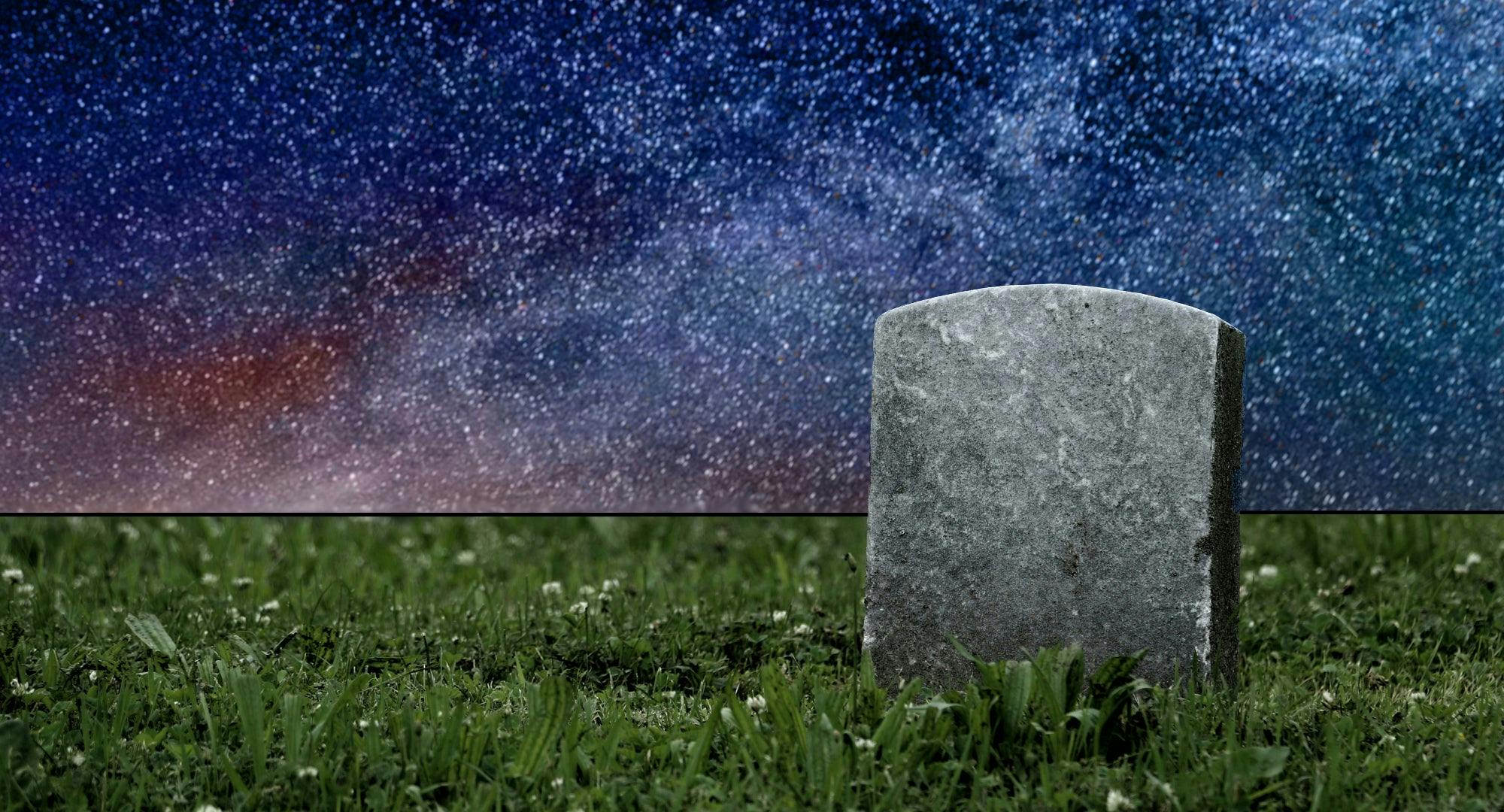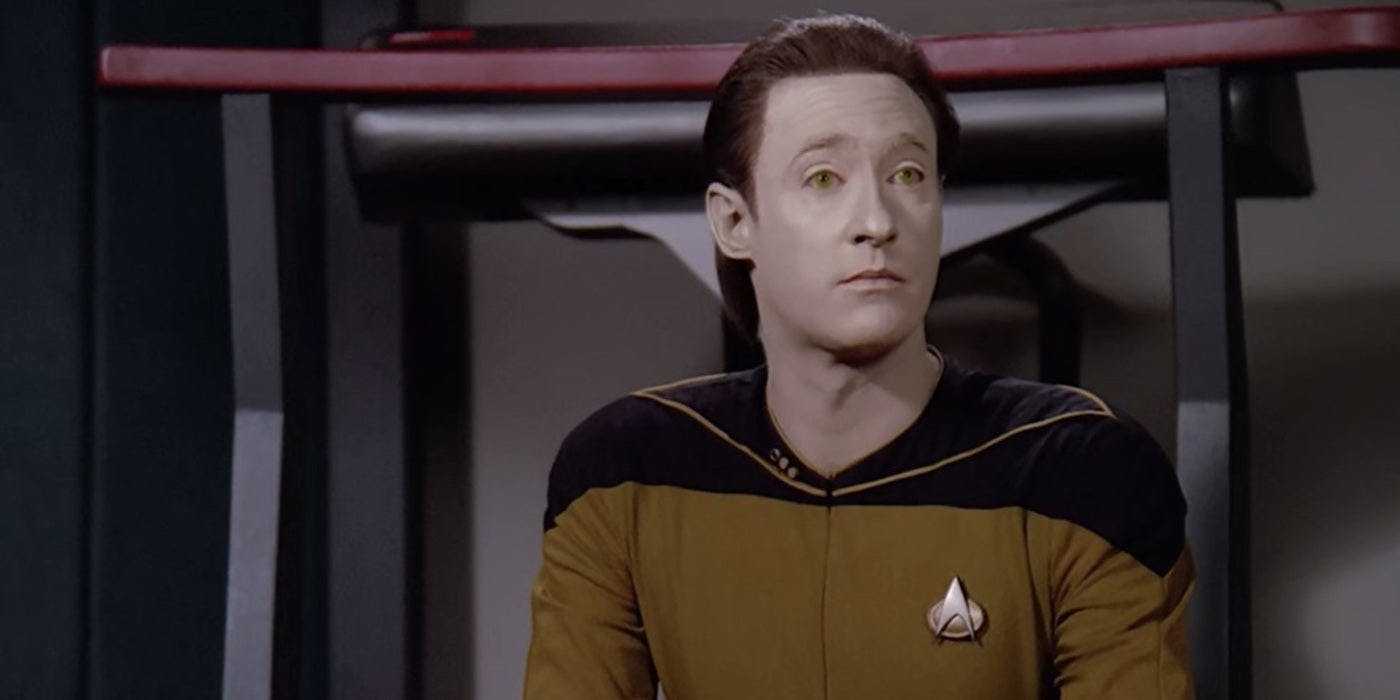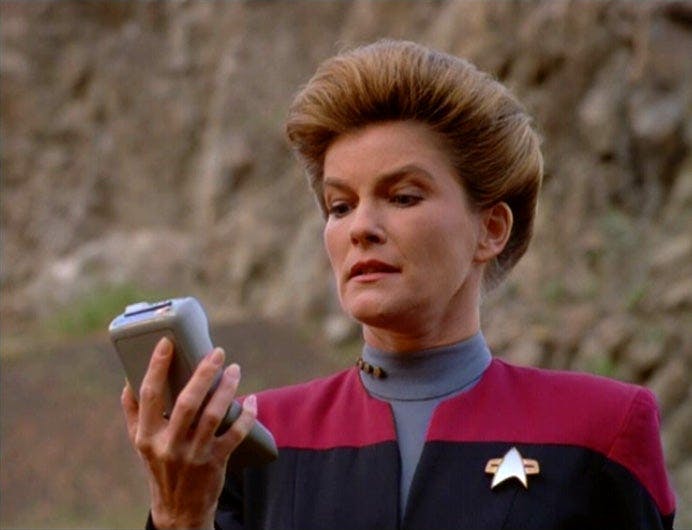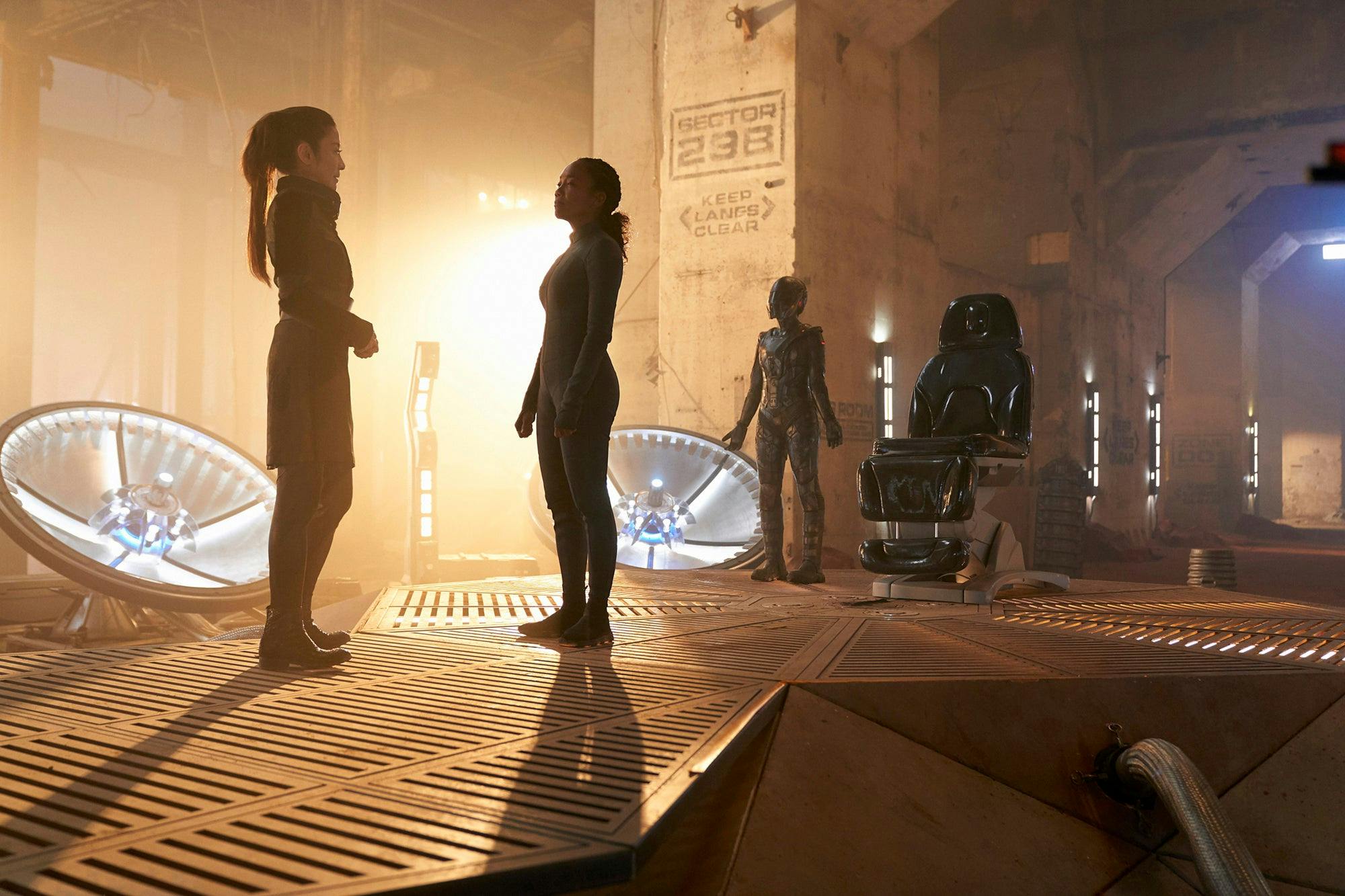Published Jun 17, 2019
My Dad Introduced Me to Star Trek
And it's helped me navigate his death for years.

StarTrek.com
If you’re in the Dead Dad’s Club, Father’s Day can be kind of a sticky wicket. Typically I simply pay it no heed – my dad wasn’t someone who relished in his own celebration, and he had a famous abhorrence for what he termed “greeting card holidays.” There’ve been years I straight-up miss it until a well-meaning friend texts a heart emoji or sweet message, and I have to feign thanks when, in reality, I’m embarrassed to have been totally oblivious. But there are also years – years like these – that find him tooling around my brain more than usual. That’s been especially true of 2019. We both loved Star Trek, and as happy as I’ve been to see the bevy of news, new shows, and active fandom this year has brought, it’s also made me think about my dad, and our mutual love of the franchise. There’s no end to the ways Star Trek has helped me navigate his death over the years.

StarTrek.com
One of my earliest memories involves both my father and The Next Generation. I was probably four years old, and we were watching it after a Sunday night dinner at my grandmother’s house. I noticed Data’s pale, iridescent skin and asked, “Is he a robot?” to which my father simply responded, “Yup,” with satisfaction, not breaking eye contact with the screen. I remember feeling slightly miffed that what I’d considered to have been a pretty salient insight for someone my age had gone relatively unnoticed, but I also noted his rapt interest. My parents divorced when I was two, and his ensuing absence perhaps predictably made me worship the ground he walked on. Anything we shared together was a prize, whether it interested me greatly or not, so Star Trek —despite my not coming to a more conscious awareness of it until later — has been precious to me for nearly my entire life, simply because he enjoyed it.
He passed away suddenly when I was ten – a motorcycle accident that shocked and devastated nearly everyone who knew my charismatic, but stable stock broker father. I wasn’t aware of it at the time, but I needed some escapism after the dust settled. That’s when I started watching Star Trek in earnest. TNG aired in syndication on our local Fox affiliate at 10pm on weeknights, and it caught my attention during the summer months when I was allowed to stay up that late. It wasn’t long before I was well and truly h-o-o-k-e-d. When school started again, I fought my bedtime with blank VHS tapes, obsessively recording and hoarding every single episode that aired. Shout-out to my mom who didn’t know what to make of my new occupation, but made gifts of Memorex 3-Packs at every opportunity.
The only thing I wanted from reality was my father back, and no one could provide that for me, so I exited my reality and found someplace else to live. Given the choice, I would much rather have joined Starfleet and occupied a life devoid of the problems that plagued mine: never enough money, huge barriers to the career I wanted to pursue, and a father who might have been saved if he’d had Dr. Crusher’s medical care. Star Trek provided much-needed respite and continues to do so to this day. That said, there was a time when I did encounter its limits and eventually had to come to the conclusion that my escapism could be as harmful as it was restorative.

StarTrek.com
TNG was my first love, but when Captain Kathryn Janeway rode into town on Star Trek: Voyager, she eclipsed all else. As enamored as I was with the crew of the Enterprise-D, they didn’t hold candle to her; she utterly hypnotized me. I didn’t realize this at the time, but Janeway was representation before I knew what that was or that I needed it. We were both single-minded Irish brunette’s and I found her confidence, intelligence and ability wholly aspirational. As if that weren’t enough, Janeway had also lost tragically lost a father she adored and whose approval and attention she’d craved her whole life. A significant portion of Jeri Taylor’s novel Mosaic confronts Janeway’s intense depression and subsequent isolation in the months after Edward Janeway’s death. The chapters detailing the time she spent shutting out the world in her childhood home, sleeping her days away, ultimately served as a model for how I’d started to use Star Trek to shut out anything I didn’t want to deal with. This included, though wasn’t limited to, my entire adolescence and lingering unresolved feelings surrounding my father’s death.
I didn’t have a particularly easy time of it in high school. To start, I switched to a private, all-girls institution after spending the bulk of my education in co-ed public spaces. I started freshman year without the tightly-knit group of friends that had been my support system since first grade, and without the necessary skills to make a new one. Add to that a rich fantasy life that remained preferable to reality, and I spent most of that year careening between loneliness, casual friendships, and Star Trek — my love for which had started to become all-consuming.
I begged and pleaded to change schools early on, and in the harrowing struggle that followed, my mom refused to budge, but she did start me in therapy. It wasn’t long before I was diagnosed with mild depression, and I started to realize how complete my rejection of the world outside my imagination had become. As I attempted to navigate high school, I couldn’t escape the feeling that perhaps I was doing the same thing as Janeway. After the initial onslaught of grief after his death, I had pretty much gone back to life as usual, but had indulged in escapism instead of dealing with the lingering repercussions of a life without my father. In previous years I had an active social life to balance my fantasy life, but starting high school left me with Voyager, fanfic and a persistent sadness that demanded attention at a dull roar.
This realization, and the therapy that helped me come to it, didn’t change things overnight, but it was a first step in the right direction. By the end of my senior year, I’d managed to make better friends, cultivate new interests and come out of my shell a little bit. I also reengaged with parts of my life I’d abandoned when my dad died – I started going to his church here and there, reconnected with certain family members and spoke more openly about the ongoing process of dealing with his death. Don’t get it twisted, I was still fully absorbed with Star Trek, but after Voyager’s series finale and before I left for college, I made the conscious decision to put the franchise – and that level of fandom in general – aside. I knew if I didn’t make myself focus on building a new life, I simply wouldn’t, so I distanced myself from my beloved space family for a few years in favor of finding something more palatable within the real world. That did mean I skipped out on Enterprise in its entirety (sorry guys – truly nothing personal), but it also meant Star Trek was able to remain something that nourished me instead of mutating into something harmful. Embracing life was something my father was known for, after all, and as much as he liked Star Trek, he wouldn’t have approved of me hiding within it for as long as I had.
But, as with everything, my fandom and my grief continue to evolve together resulting in new challenges as time passed. Here’s where I admit that despite being what I would consider a pretty well-adjusted, optimistic person in spite of everything, there are still days when I feel intense resentment about having to live without my dad. I resent him for getting on a motorcycle when he had no business being on one. I resent whatever higher power there may be for capriciously taking him away from a family who desperately needed him. I resent having to clear the hurdles set down by experiencing that kind of trauma at such a young age (yes, blah blah blah, makes me stronger, but sometimes I get tired of jumping). But then I started watching Star Trek: Discovery.

Steve Wilkie/CBS ©2018 CBS Interactive
“Perpetual Infinity” saw Michael Burnham, the orphaned ward of Sarek and Amanda, reunite with the mother she’d thought long dead. Gabrielle Burnham turned out to be the Red Angel, and the complex way Discovery rendered their reunion hit me square in the Feels. It was fraught and kind of joyless. Michael had to physically be held back from going to the woman and her heart broke into a million pieces when she found out that Gabrielle didn’t want to see her. Eventually Michael forces her mother’s hand and the two manage to reconnect before Gabrielle is forced back into the future, but the fact that their reunion wasn’t a fairy tale spoke to me on a level few narratives about parental loss ever have.
Star Trek wasn’t the only way I escaped my grief in those early days; I spent a lot of my time wishing away the reality of my dad’s death with intensity. Some part of me believed that if I prayed hard enough, God would grant me the miniscule favor of returning him to me. I think this was because I was just too young to accept the utter finality of the situation, or to consciously live with the unimpeachable fact that anyone – literally anyone – I loved could blink out of existence. Just like Gabrielle. That’s truly how it felt when my world broke 26 years ago, and my dad’s priest came to tell me what my mother couldn’t. Even as I grew out of actively wishing his death away, there was always a small part of me I let hope he would come back because it, like Star Trek, shielded me from a terrifying reality.
Unfortunately, even that little bit of hope became a toxic barrier between me and acceptance. Why was that a problem? Well, it’s hard to be an effective grown person when one of your key strategies for dealing with adversity is literally pretending it’s not real. But Michael Burnham’s experiences surrounding her mother’s return helped me gain some clarity on the entire situation that eventually led to me being able to peacefully lay down one of my last fantasies. Watching the Burnhams struggle with the literal time and space between them forced me to face something my brain had been dancing around for the past few years: even if my father did, somehow, miraculously return after all this time, he would either be an incredibly selfish person who had stayed away from his children on purpose, or he would have suffered greatly in some kind of extreme captivity. The current reality is far preferable to either of those outcomes.
If I go even further and simply wish his death had never happened, I come face-to-face with the fact that I would also be wishing away the person I am today. Michael Burnham’s entire story reinforces that fact – her struggle with her identity as an orphan and a human raised by Vulcans contributes not only to what makes her story compelling, but also to what makes her a good person in general.
I’m not saying that I’m glad for my dad’s death,because it made me such an awesome person — far from it. But it’s been an important step in my grieving process to acknowledge that where I used to see his loss as terrifying and awful, I can now realise that it’s an integral part of the person I’ve become – a person who deserves to be honored and explored instead of ignored in favor of a fantasy that’s no longer viable.
I never completely forget a Father’s Day. Even if I don’t remember until a week has gone by, I do pay it some heed. Lately that heed has taken the form of gratitude - there are so, so many gifts my dad gave me that make me incredibly grateful for what the time we did have together. This year it’s clear Star Trek is one of them, not that I needed reminding.
Alexandra August is a journalist and podcaster in the Los Angeles area. She freelances for multiple outlets and co-hosts The DiscoTrek: A Star Trek Discovery podcast. Tweet her @alxaugust.

